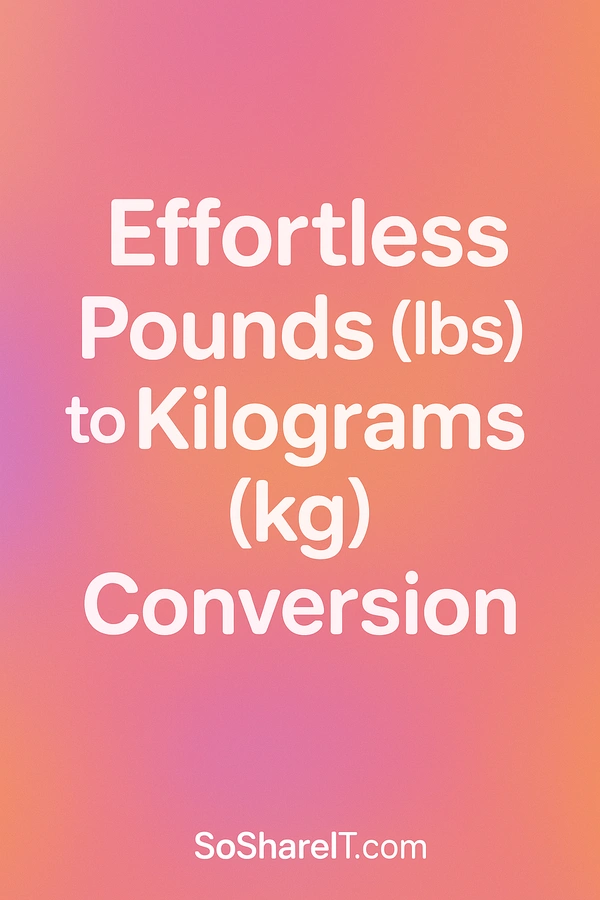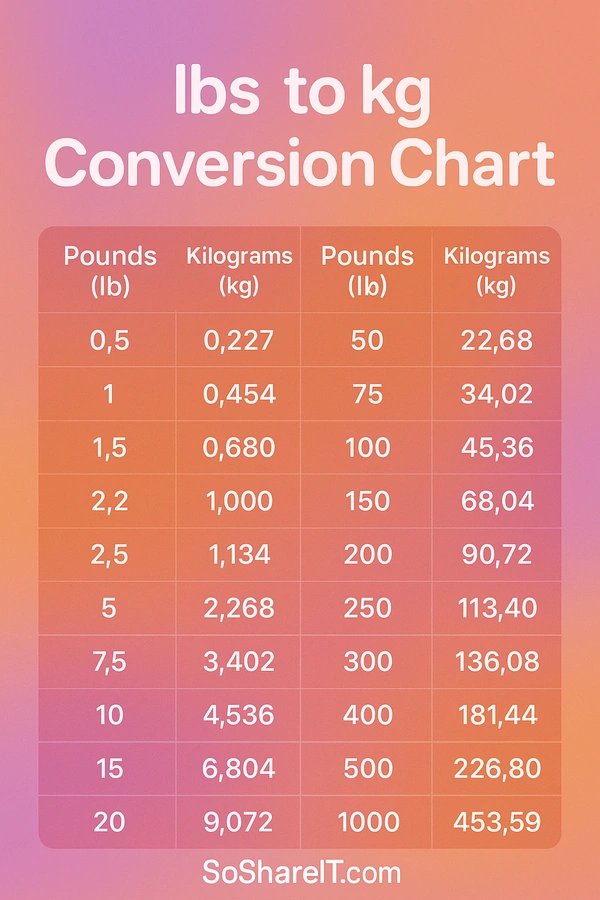Other Units
Enter a value in any field to convert.
Introduction
Whether you’re checking airline baggage limits, logging weight-training progress, or adapting an American recipe to metric, you’ll eventually run into the need to convert pounds to kilograms. Searching “lbs to kg converter” or “lbs to kg calculator online” brings up dozens of tools—but a truly useful resource should do more than spit out a number. It should explain how the conversion works, offer quick-reference charts for common values (1 lbs to kg, 50 lbs to kg, 150 lbs to kg, and so on), and answer real-world questions like “How many kg in 100 lbs?”

That’s exactly what you’ll find here. Below you’ll get:
- A crystal-clear formula for manual calculation.
- A conversion chart covering 0.5 lb up to 1000 lb.
- Direct links to the interactive lbs-to-kg converter already built into SoShareIT Converter.
- Answers to the most frequently searched queries, from “How to convert lbs to kg?” to “What is 150 lbs in kg?”
- Bonus tips for converting pounds to grams, ounces, metric tons, stone, newtons, gallons, and even cups of water.
By the end of this guide you’ll be able to convert any pound value to kilograms with confidence—and understand the math behind it.
1. What Are Pounds and Kilograms?
Pounds (lb or lbs)
- Origin: Derived from the Roman lībra pondo (“pound by weight”).
- Usage: Predominantly in the United States and, to a lesser extent, the United Kingdom for body weight, food products, and industrial loads.
- Definition: Since 1959 the international avoirdupois pound has been standardized at 0.453 592 37 kilograms.
Kilograms (kg)
- Origin: Established in France during the French Revolution as part of the metric system.
- Usage: The SI base unit of mass—officially adopted worldwide for science, medicine, and commerce.
- Definition: As of 2019 the kilogram is defined via the Planck constant, ensuring absolute consistency across all physical standards.
Why it matters: Understanding the precise definitions ensures your conversions meet scientific and regulatory requirements, especially for medication dosages, engineering specs, and international shipping.
2. Why Convert Pounds to Kilograms?
| Scenario | Imperial figure | Metric figure |
|---|---|---|
| Fitness tracking | 185 lbs bench press | ≈ 83.9 kg |
| Pet health | 22 lbs dog food bag | ≈ 9.98 kg |
| Air cargo | 150 lbs suitcase | ≈ 68 kg |
| Recipe scaling | 2 lbs flour | ≈ 0.91 kg |
If you live or trade in a metric-dominant region—or simply want universal clarity—knowing the kilogram equivalent keeps you safe, compliant, and understood.
3. The Simple lbs → kg Formula
kilograms = pounds × 0.453 592 37
Example: Convert 20 lbs to kg
- Multiply 20 by 0.453 592 37.
- 20 × 0.453 592 37 = 9.071 847 4 kg (often rounded to 9.07 kg for everyday use).
Tip: For mental math, approximate 1 lb as 0.45 kg—a 1% margin of error acceptable for non-critical tasks.
4. Quick-Reference lbs to kg Conversion Chart
| Pounds (lb) | Kilograms (kg) | Pounds (lb) | Kilograms (kg) |
|---|---|---|---|
| 0.5 | 0.227 | 50 | 22.68 |
| 1 | 0.454 | 75 | 34.02 |
| 1.5 | 0.680 | 100 | 45.36 |
| 2.2 | 1.000 | 150 | 68.04 |
| 2.5 | 1.134 | 200 | 90.72 |
| 5 | 2.268 | 250 | 113.40 |
| 7.5 | 3.402 | 300 | 136.08 |
| 10 | 4.536 | 400 | 181.44 |
| 15 | 6.804 | 500 | 226.80 |
| 20 | 9.072 | 1000 | 453.59 |
Feel free to bookmark this table for instant answers to the most searched phrases—“1 lbs to kg” through “1000 lbs to kg.”

5. Interactive lbs-to-kg Converter & Calculator
Manual math is excellent for understanding, but speed matters when deadlines loom. That’s why SoShareIT Converter hosts a free, mobile-friendly lbs-to-kg calculator. Here’s what sets it apart:
- Real-time results: Type or paste any value—decimals welcome—and the kilogram result appears instantly.
- Bidirectional switching: One click toggles to the kg-to-lbs direction if you need the reverse calculation.
- High precision: Up to five decimal places, matching scientific standards.
- Copy & share: Tap the copy icon to place the result in your clipboard—perfect for chat apps, spreadsheets, or labeling.
- No ads, no paywall: The tool is 100 % free, forever.
Try it now: Visit https://converter.soshareit.com/lbs-to-kg, enter any pound value from 0.001 to 100 000, and see the precise kilogram equivalent in less than a second.
6. Step-by-Step: How to Use the Online Calculator
- Open the tool in your browser or mobile (no app download required).
- Select “lbs → kg” if it’s not already highlighted.
- Input your value—for example, “150”.
- Read the result: “68.0389 kg” appears immediately.
- Copy or share with the on-screen buttons, or hit “Reset” to start a new conversion.
Power users can bookmark the tool, add it to their smartphone home screen, or integrate the URL into Google Sheets’ IMPORTDATA() function for live conversions inside a spreadsheet.
7. Frequently Asked Questions
How to convert lbs to kg?
Multiply pounds by 0.453 592 37 (the exact conversion factor). For everyday estimates, 0.45 is close enough.
What is 150 lbs in kg?
150 lbs × 0.453 592 37 = 68.0389 kg—usually rounded to 68 kg.
How many kg in 100 lbs?
100 lbs × 0.453 592 37 = 45.359 kg.
How much is 1 lb in kg?
1 lb equals 0.453 592 37 kg—often shortened to 0.454 kg.
Do I need a calculator?
For critical tasks—medical dosing, scientific research, engineering specs—yes, use a calculator or the SoShareIT tool for full precision. For cooking or gym tracking, approximations are fine.
Is “lb” different from “lbs”?
“lb” is the singular abbreviation of pound, while “lbs” is its common plural. Both convert using the same factor.
Why does my digital scale show a slightly different kg value?
Home scales may round or be out of calibration. Always check manufacturer specs and, if required, recalibrate with certified weights.
8. Converting Pounds to Other Units
- Pounds to grams: Multiply by 453.59237.
- Pounds to ounces: Multiply by 16.
- Pounds to stone: Divide by 14 (popular in the UK).
- Pounds to metric tons: Multiply by 0.000 453 592 37.
- Pounds to newtons (force): Multiply by 4.448 221 615 3.
- Pounds to gallons or cups: Only applicable for water (density ≈ 1 kg/L). First convert lbs to kg, then kg to liters (1:1), then apply the container unit (e.g., 1 L ≈ 4.22675 cups).
For each of these, SoShareIT offers dedicated converters—browse the dropdown menu on any converter page.
9. Beyond the Basics: Advanced Tips
- Rounding rules: Financial or pharmaceutical contexts may require two decimal places, whereas logistics often accept whole numbers.
- Batch conversions: Paste a comma-delimited list (e.g., “5, 10, 20”) into the SoShareIT calculator to receive a line-by-line kilogram breakdown.
- Error checking: When coding a lbs-to-kg converter app, set validation to reject non-numeric input and extremely large values that exceed floating-point limits.
- Spreadsheet integration: In Excel or Google Sheets, multiply your lbs column by
0.45359237and set the cell format to “Number” with desired decimal places. - Voice commands: On Android, Google Assistant understands “Convert 37 pounds to kilograms” and returns a speaker-read answer—handy when your hands are busy.
Conclusion
Converting pounds to kilograms doesn’t have to slow you down. Remember the key factor—1 lb = 0.453 592 37 kg—or, better yet, rely on the SoShareIT lbs-to-kg converter for instant, precise results. Whether you need a quick check for “2.5 lbs to kg” or a comprehensive lbs to kg conversion chart for shipping logistics, this guide—and the free tool it links to—will keep your numbers accurate and your workflow smooth.
Ready to convert? Bookmark https://converter.soshareit.com/lbs-to-kg, enter any pound value, and let the calculator do the heavy lifting. Happy converting!